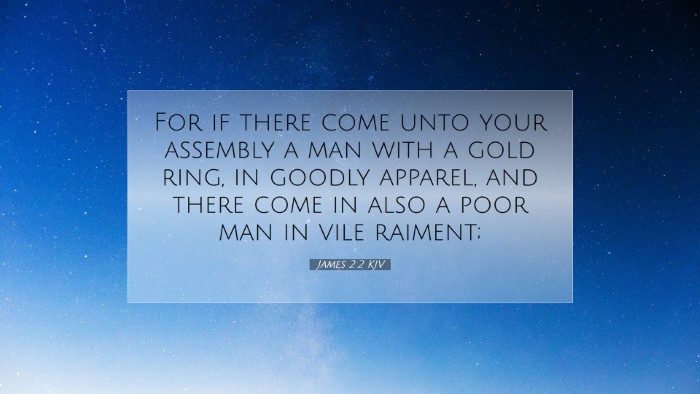Old Testament
Genesis Exodus Leviticus Numbers Deuteronomy Joshua Judges Ruth 1 Samuel 2 Samuel 1 Kings 2 Kings 1 Chronicles 2 Chronicles Ezra Nehemiah Esther Job Psalms Proverbs Ecclesiastes Song of Solomon Isaiah Jeremiah Lamentations Ezekiel Daniel Hosea Joel Amos Obadiah Jonah Micah Nahum Habakkuk Zephaniah Haggai Zechariah MalachiJames 2:2
James 2:2 KJV
For if there come unto your assembly a man with a gold ring, in goodly apparel, and there come in also a poor man in vile raiment;
James 2:2 Bible Commentary
Commentary on James 2:2
James 2:2 states: "For if there come unto your assembly a man with a gold ring, in goodly apparel, and there come in also a poor man in vile raiment." This verse introduces the critical theme of partiality within the community of believers.
Introduction
This verse illustrates a scenario that was familiar to the early church, wherein the treatment of individuals based on their socio-economic status becomes a matter of contention. The implications of this scripture reach deeply into the hearts and practices of contemporary faith communities.
Exegesis of James 2:2
James begins by presenting a vivid illustration involving two distinct characters: one dressed in fine, extravagant clothing, symbolizing wealth and status, and another clothed in tattered garments, representing poverty and lack.
Wealth vs. Poverty
Matthew Henry's Commentary emphasizes the stark contrast between the two individuals. The rich man is adorned with symbols of wealth, such as a gold ring and fine apparel. In contrast, the poor man is described as wearing "vile raiment," indicating he is in a state of disregard in societal norms.
Albert Barnes notes that this scenario was not merely theoretical but a common occurrence in the assemblies of that time. The worship gatherings served as a microcosm of society, where distinctions of wealth were often perpetuated inside the church.
Assembly Dynamics
This verse also reveals insights into communal practices. Adam Clarke points out that the term "assembly" refers to the gathering of believers, where mutual respect and equality should ideally be upheld. The presence of partiality disrupts the foundational principles of Christian brotherhood and unity.
Theological Implications
The implications of this passage are profound for both the church and individual believers. It forces a reflection on the nature of favoritism and its antithetical stance to the gospel. The church is called to be a place where all believers are treated with dignity, regardless of their economic situation.
Sin of Partiality
Matthew Henry argues that showing partiality is a direct conflict with the Christian doctrine of love. How believers treat one another reveals their understanding and application of God's love. Preferred treatment based solely on external factors undermines the principle of equality before God.
Societal Reflection
Albert Barnes contemplates the implications of this behavior on the witness of the church to the world. By favoring the wealthy, the church risks alienating the marginalized and reinforcing unjust societal norms. The call for the church is to redefine value based on spiritual standing rather than external wealth.
Practical Applications
For pastors, students, and theologians, this verse presents an opportunity for introspection regarding congregational practices and community engagement. Questions to consider include:
- How does our church treat individuals of differing economic backgrounds?
- Are we creating spaces that cultivate authentic relationships free from bias?
- In what ways can we embody the principles of love and equality spoken of in scripture?
Dispelling Favoritism
Adam Clarke encourages a comprehensive evaluation of church customs and policies that may inadvertently promote discrimination. Pastors are urged to cultivate an environment that emphasizes shared identity in Christ, rather than external appearances.
Equipping the Saints
Lastly, this verse serves as a mandate for believers to actively resist the cultural pressures that endorse favoritism. The Apostle James challenges the faithful to be instruments of God’s grace by showing compassion to all, thus reflecting God's justice and mercy.
Conclusion
James 2:2 is not merely an admonition against favoritism; it is a deep call to action for the church to embody the inclusive love of Christ. By prioritizing the teaching of unity and equality, the body of Christ can effectively demonstrate God’s love to the world. Pastors and leaders have a crucial role in shaping congregational attitudes that align with this biblical directive.


